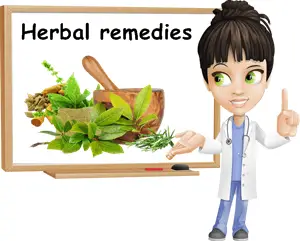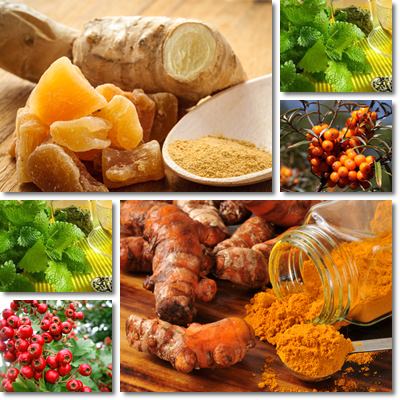Nowadays we treat every ailment with synthetic pharmaceuticals in the form of pills, tablets, drops, gels, syrups and so on. But there are cases when even conventional medication fails to offer us a fitting solution for what ails us. Often, when looking to improve or restore health and wellness, going herbal is the key. From rose hip and yarrow to St John’s wort and sea buckthorn, medicinal plants present themselves as excellent solutions to real medical problems.
Anxiety, insomnia, restlessness, concentration problems, digestive upset, various infections and skin conditions can all be managed with the help of various herbal preparations. Essential oil constituents in various medicinal plants and herbs have been found to posses excellent tonic, restorative, anti-inflammatory, pain-relieving, antispasmodic, antibacterial, antifungal and even anticancer properties. Although, the use of herbs for medicinal purposes may sound like an outdated and chimeric practice, before discrediting it as unsafe or inaccurate we should remind ourselves that our most efficient pharmaceuticals are almost always derived from various plants and herbs.

Despite many medical professionals discrediting the use of medicinal plants for improving various conditions and health in general, the scientific community shows increasing interest in the properties and health effects of medicinal plants and preparations made from them. Aside from wives’ tales, there is sound scientific research we can rely on to tells us exactly what are the properties, benefits, side effects, risks and adequate dosage of varied plant preparations. Reservation towards the use of herbs with medicinal properties is perfectly understandable, but you might just have a change of heart once you try these 6 amazing herb-based remedies below.
Which healthy herbs for what health issue?
Ginger for inflammation
Whether it’s a sore throat or gastritis as a result of a Helicobacter pylori infection, high inflammation levels in the body or arthritis pain due to swollen and stiff joints, ginger (Zingiber officinale) is the perfect remedy for you. This is because ginger is an incredible natural anti-inflammatory, capable of drastically reducing inflammation levels in the body. It is such a potent herb that people have even reported getting rid of the persistent Helicobacter pylori bacteria by consuming a teaspoon of honey with a sprinkle of ginger every morning for 6 months.
The key is to eat ginger regularly and in small amounts. You can eat it fresh, in powder form mixed in a glass of fruit juice or drink it as a tea. However, the same constituents in ginger that are responsible for its health benefits for some of us may cause adverse reactions in other people. For example, fresh or dried ginger is not recommended for hemorrhoids or gastritis. See the 7 reasons not to eat ginger.

St John’s wort for depression and anxiety
St John’s wort (Hypericum perforatum) is one of those incredible plants that are more effective than conventional medication itself. The herb exhibits great effectiveness in the treatment of anxiety, panic attacks and even depression and has been shown to be much more efficient and even safer than regular antidepressant medication.
When it comes to natural remedies, it is important we remember to always ask for our doctor’s advice regarding any new treatment we are considering. This also means we should not discontinue medication and follow the doctor’s recommendations closely to avoid possible side effects and interactions. St John’s wort contains hypericin, a compound that inhibits a class of enzymes known as monoamine oxidases which were linked to depression and anxiety, hence its efficacy. However, studies show that the herb increases the effects of regular antidepressant medication, so, if you are already on antidepressants, discuss this option with your doctor prior to taking St John’s wort.
Yarrow for bleeding
Yarrow (Achillea millefolium) is an amazing medicinal herb. It goes by the names of common yarrow, arrowroot, bloodworth, eerie, hundred leavedfrass, milefolium, milefoil, noble yarrow, nosebleed, sanguinary, soldier’s woundwort, thousand seal and so on. As you have probably noticed, most the many names it has been attributed reveal its most potent effect: stopping bleeding. Consuming 2-3 cups of yarrow tea made by infusing dried yarrow leaves, stems and flowers is excellent for inducing clotting and stopping bleeding, for reducing inflammation, fewer and pain (learn more about the benefits of yarrow).
Turmeric as an antioxidant and cancer-preventive agent
Curcuma longa is a member of the ginger family and an excellent natural anti-inflammatory, antibacterial and anticancer food. The spice boasts an extreme vitamin and mineral content and is especially rich in antioxidants. Adding turmeric to almost any dish at the end of the cooking process (rice, chicken, sunny side up eggs and so on) contributes immensely to reducing inflammation levels in the body. You can also make golden milk using turmeric. Learn more about the benefits of Golden Milk and how to make it yourself at home.
Inflammation has been linked to increased cardiovascular disease and cancer risks, hence the importance of consuming anti-inflammatory foods. A great potential use for turmeric is tooth aches. Apply turmeric powder to the ailing tooth to temporarily help reduce the pain sensation.
Sea buckthorn, hawthorn and rose hip for cardiovascular health
The common sea-buckthorn (Hippophae rhamnoides), hawthorn (Crataegus monogyna) and rose hip (Rosa canina) are three incredible herbs with wonderful benefits on cardiovascular health. The sea-buckthorn is ideal for reducing high blood pressure and blood cholesterol.
Hawthorn infusions not only increase the efficacy of certain hypertension medication, but were also shown to help in the treatment of palpitations, fatigue associated with heart failure, shortness of breath, chest pain and hypertension. Last, but not least, rose hip is a great natural diuretic with considerable blood pressure-lowering properties.
Valerian, lemon balm and chamomile for relaxation
Valerian (Valeriana officinalis) is a wonderful complementary solution for anxiety sufferers thanks to its strong sedative properties. In addition to relieving anxiety, valerian reduces hyperactivity, relieves stress, migraines and improves sleep quality. Lemon balm (Melissa officinalis) is a great natural remedy for sleep disturbances with mild sedative and analgesic properties. Chamomile (Matriarca recutita, Chamaemelum nobile) has calming effects on the nervous system and, at the same time, boasts anti-inflammatory and pain-relieving properties (great for relieving colic).
Conclusion
These 10 wonderful herbs can be a great addition to your pantry and provide benefits for health, provided you are not allergic to them and do not exceed the dosage prescribed by your healthcare professional or recommended on the package (such as for teas, supplements etc.). Pregnant and nursing mothers however are advised to avoid medicinal herbs altogether as research on their effects on pregnancy evolution and baby health are poor.
